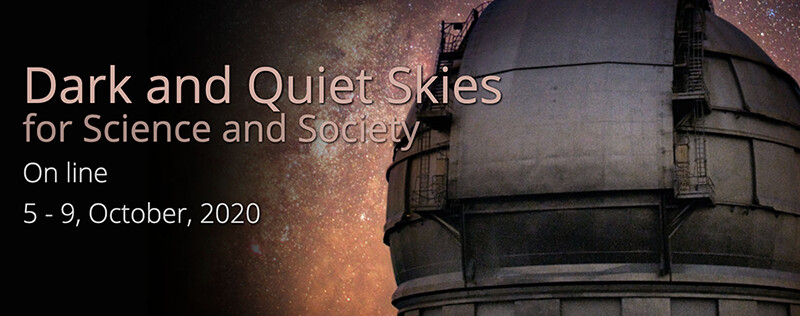Dark and Quiet Skies for Science and Society
Monday, 05 October 2020 8 a.m. MST - Friday, 09 October 2020 10 a.m. MST
Your time:

Online event
The online workshop takes place on Zoom from 15:00 UTC to 17:00 UTC (=17:00 to 19:00 Central European Summer Time) on 5-9 October, 2020. It will be recorded for later viewing. The workshop will present initial findings from 5 working groups of the Scientific Organising Committee (SOC), for discussion. Within the two-hour period, presentations will first be made by one of the Working Groups and open discussion will follow. Each day of the workshop focuses on a different topic.
Monday 5 October: protection of dark sky oases
The creation and protection from light pollution of areas from which people can enjoy the clear visibility of the starry sky aims to solve the widest and most general incidences of light pollution.
Tuesday 6 October: light pollution impact on the bio-environment
While this aspect is not directly related to astronomy, it is a consequence of the global effects of new illumination technologies. By protecting the night sky from light pollution, negative effects on the bio-environment can also be mitigated without affecting the needed illumination and provide a substantial saving in energy consumption.
Wednesday 7 October: protection of existing and future astronomical observatories
Several Countries and International Organisations have made very large financial investments in building and operating large astronomical facilities. Most of these facilities are open to astronomers of any Country. In the interest of the world community, these sites need to be protected from light pollution and from artificial local climate alterations.
Thursday 8 October: impact of satellite constellations
The impact of the tenths of thousands of communication satellites that are being placed in LEO (Low Earth Orbit) has only recently raised the attention of the astronomical community and of the general public. Their real impact has now been carefully established on the basis of sound simulations and initial observational data.
Friday 9 October: protection of radio astronomy
Similar to the impact of satellite constellations on optical astronomy, radio interferences can also be geographically wide-ranging. Radio astronomy has a long history of successful international agreements on the protection of radio interests from anthropic ground-based radio broadcastings. However, the large number of additional communication satellites will make regulatory action even more important.